Far too many people continue to ignore the medical authorities, proving it's impossible to fix "stupid".COVID-19 hospitalization and ICU admission rates rising across Canada: Tam
Author of the article:Canadian Press
Canadian Press
Publishing date:Apr 24, 2021 • 1 hour ago • 1 minute read • Join the conversation
Passengers arrive at the B.C. Ferries terminal as new non-essential travel restrictions between provincial health authority regions were announced, in order to help limit the spread of COVID-19, in Tsawwassen, B.C., April 23, 2021.
Passengers arrive at the B.C. Ferries terminal as new non-essential travel restrictions between provincial health authority regions were announced, in order to help limit the spread of COVID-19, in Tsawwassen, B.C., April 23, 2021. PHOTO BY JENNIFER GAUTHIER /REUTERS
Article content
OTTAWA — Canada’s Chief Public Health officer says the latest national data shows an ongoing rise in severe illness from COVID-19 is continuing to strain the country’s health-care systems and workers.
Dr. Theresa Tam says in a statement that average weekly rates of admission to hospitals, including intensive care units, continue to climb, even with a slight decline in overall new cases.
According to Tam’s numbers, an average of 4,167 COVID-19 patients were being treated in Canadian hospitals each day during the week of April 16 to 22, marking a 22% increase over the week before.
The Amazon Fulfillment warehouse on Heritage Rd in Brampton on Saturday, April 24, 2021.
WARMINGTON: Two Amazon centres first businesses shut down to slow COVID spread
A porter loads luggage of recently arrived air travellers from New Delhi, after Canada temporarily barred passenger flights from India and Pakistan for 30 days, at Vancouver International Airport in Richmond, B.C., April 23, 2021.
Families separated by India, Pakistan flight suspensions worry about loved ones
Tam says that includes an average of 1,268 people requiring intensive care each day, which is 21% more than in the previous week.
In that same period, the average number of new cases reported each day fell by 2.6%, which she says is a sign that public health enforcement and vaccination efforts are succeeding.
Meanwhile, Ontario Premier Doug Ford is calling once again for Ottawa to halt all non-essential travel across Canadian borders, after officials in his province reported 36 confirmed cases Friday of the B.1.617 variant first detected in India.
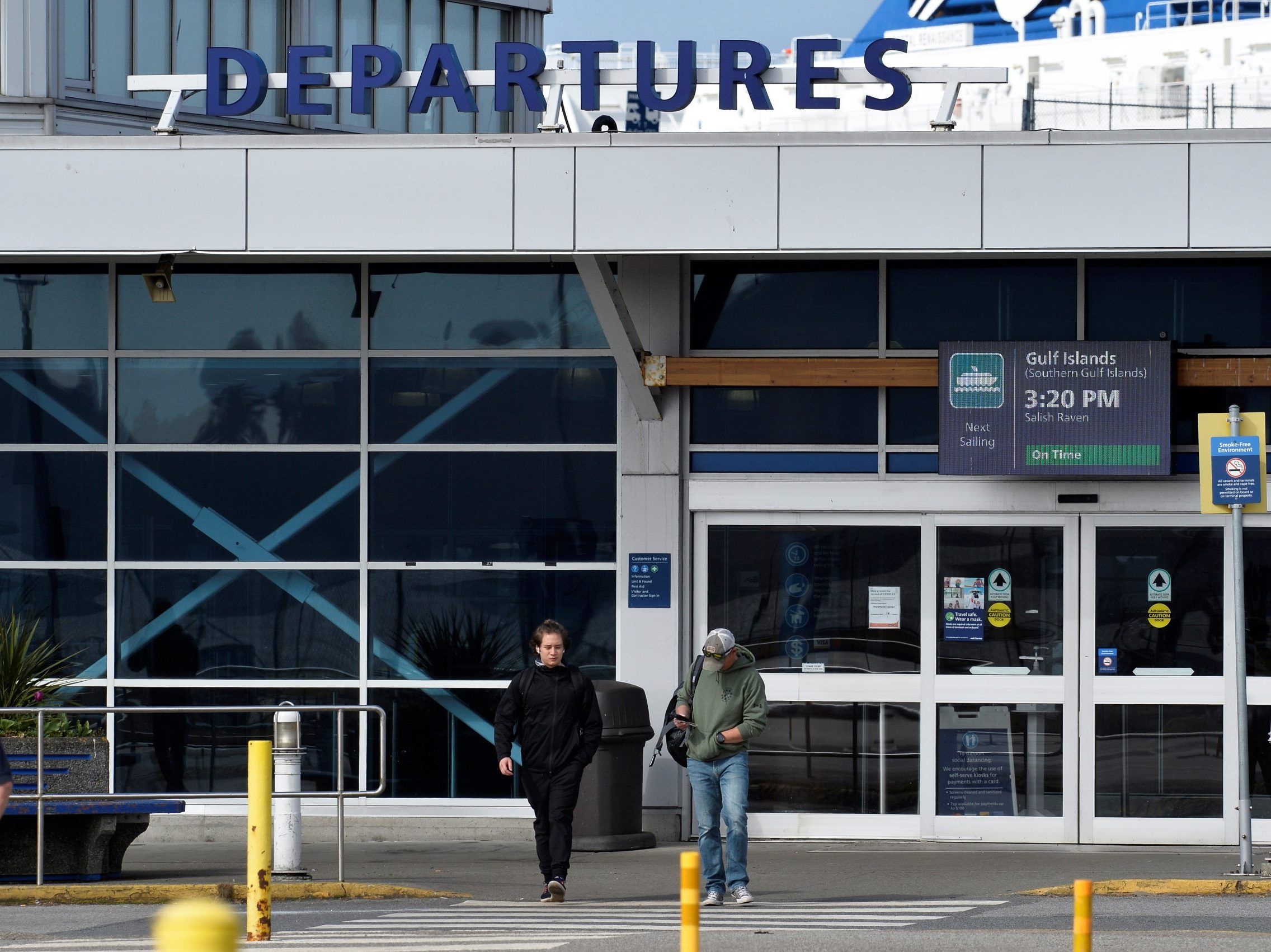
COVID-19 hospitalization and ICU admission rates rising across Canada: Tam
A steady increase in COVID-19-related admissions to hospitals and intensive care units continues to weigh heavily on Canada’s health-care system even as overall cas…torontosun.com
COVID-19 'Pandemic'
- Thread starter Ocean Breeze
- Start date
You are using an out of date browser. It may not display this or other websites correctly.
You should upgrade or use an alternative browser.
You should upgrade or use an alternative browser.
I'll say right from the start that I'm an anti vaxxer. The term has been bandied about and means lots of different things to different people. I think the way it -should- be defined is as someone who believes that -all- vaccines are bad, as laid out in books such as Dr. Jack Stockwell's book "How Vaccines Wreck Human Immunity: A Forbidden Doctor Publication". However, I am fully aware that there are many who have a more nuanced view of vaccines, with some thinking that some vaccines are good and others are bad. I made this thread to focus on the Covid vaccines. I have been following articles and reports on all 4 of the major Covid Vaccines for some time now, and have only become more persuaded that these vaccines are exceptionally bad. I thought I'd start this thread with an article by Israeli rabbi Chananya Weissman:
https://gatesofvienna.net/2021/02/31-reasons-why-i-wont-take-the-vaccine/
Constructive feedback welcome.
https://gatesofvienna.net/2021/02/31-reasons-why-i-wont-take-the-vaccine/
Constructive feedback welcome.
Found this article today on RFK Jr's Children's Health Defense site, was published a few days ago...
**
Bill Maher’s latest new rule is this: “Don’t spin me when it comes to my health.”
In the segment below, the political commentator, comedian and host of “Real Time with Bill Maher” accuses the medical establishment, media and the government of taking a “scared straight” approach to getting people to comply with their COVID recommendations.
“When all the sources for medical information have an agenda to spin us, you wind up with a badly informed public,” Maher said.
The truth, said Maher, is that only between 1% – 5% of people end up needing to be hospitalized for COVID, despite the media’s non-stop “panic porn.”
Not only that, citing figures from the Centers for Disease Control and Prevention, Maher said 78% of people who end up “hospitalized, ventilated or dead” from COVID are obese — something news outlets are “too polite” to talk about.
What the media isn’t hesitant to do is to policitize COVID — a phenomenon Maher said he finds offensive: “I don’t want politics mixed in with my medical decisions.”
**
Full article:
https://childrenshealthdefense.org/defender/bill-maher-politics-medical-decisions/
**
Bill Maher’s latest new rule is this: “Don’t spin me when it comes to my health.”
In the segment below, the political commentator, comedian and host of “Real Time with Bill Maher” accuses the medical establishment, media and the government of taking a “scared straight” approach to getting people to comply with their COVID recommendations.
“When all the sources for medical information have an agenda to spin us, you wind up with a badly informed public,” Maher said.
The truth, said Maher, is that only between 1% – 5% of people end up needing to be hospitalized for COVID, despite the media’s non-stop “panic porn.”
Not only that, citing figures from the Centers for Disease Control and Prevention, Maher said 78% of people who end up “hospitalized, ventilated or dead” from COVID are obese — something news outlets are “too polite” to talk about.
What the media isn’t hesitant to do is to policitize COVID — a phenomenon Maher said he finds offensive: “I don’t want politics mixed in with my medical decisions.”
**
Full article:
https://childrenshealthdefense.org/defender/bill-maher-politics-medical-decisions/
Canadians avoiding hotel quarantines for air travellers fuel taxi boom on U.S. border
Author of the article:Reuters
Reuters
Allison Lampert and Anna Mehler Paperny
Publishing date:Apr 25, 2021 • 12 hours ago • 3 minute read • 47 Comments
New York taxi cabs are seen parked on April 10, 2020 in New York City.
New York taxi cabs are seen parked on April 10, 2020 in New York City. PHOTO BY ANGELA WEISS /AFP via Getty Images / Files
Article content
U.S. taxi and limousine services are seeing a boom in business from customers seeking to enter Canada by land to avoid a restriction on international travel that applies only to air traffic.
While both Canadian land and air travellers are required to take a test within three days of departure, and again on arrival, only those flying to Canada must spend up to three days of the country’s 14-day required quarantine period in a hotel.
That has led to a surge of calls for taxi and limousine services from Canadians who fly through U.S. airports in states like New York and then cross over the land border, representatives of four companies told Reuters.
“They call from six in the morning to 12 at night,” John Arnet, general manager of 716 Limousine in Buffalo, N.Y. said. “We’ve had so many requests for border crossings that we’re turning them down.”
The company now does more business driving Canadians to their homes in Ontario than with U.S. clients.
Advertisement
STORY CONTINUES BELOW
This advertisement has not loaded yet, but your article continues below.
Article content
A taxi trip across the border can cost around $200 or $250 compared with a three-day hotel stay of more than C$1,200 ($961), Canadian travel insurance broker Martin Firestone said.
With the Canada-U.S. land border mostly closed for more than a year due to the pandemic, and overall tourism down, the recent surge in business has come as a relief to some struggling taxi operators.
Nick Boccio, general manager of Buffalo Limousines, said the Canadian clientele has helped the company bring back chauffeurs.
On Friday, Boccio said the company gave nine different rides to Canadian passengers on just one flight from Florida.
Canada has imposed tough restrictions since the start of the pandemic, including a ban on most foreigners from entering the country. Canadians can fly out of the country and return either by land or air.
But concerns are mounting due to a surge in virus variants, with the once temporary hotel quarantine now mandatory for air travelers through late May, and a ban introduced this week on direct flights from India and Pakistan.
Firestone said some of his clients who spent the winter in Florida are returning by land to avoid hotels. Some get rides; others who usually get their cars shipped are driving them north.
“Every single limousine company has got on the bandwagon,” Firestone said.
Some Canadians ask to be driven home, while others take rides to the border, cross on foot and get another ride in Canada, drivers said.
Advertisement
STORY CONTINUES BELOW
This advertisement has not loaded yet, but your article continues below.
Article content
Non-commercial land border crossings were 60% higher during one week at the end of March and beginning of April than in the same week in 2020, according to data from the Canada Border Services Agency. Air travel for that same week, meanwhile, increased 18.8%. The discrepancy between the rules at the land border and by air is a sore point for Canada’s hard-hit carriers.
Unlike land travelers who can choose where to quarantine, air passengers who test positive at a hotel must self-isolate at a government-mandated facility.
According to Public Health Agency of Canada (PHAC) data for Feb. 22 through March 25, 1.5% of air passengers to the country tested positive for the virus on arrival compared with 0.3% of land travellers.
The boom for U.S. taxis could soon be muted as premiers from Canada’s two most populous provinces, Quebec and Ontario, have urged Prime Minister Justin Trudeau to take further action at the land border.
Tighter requirements might help, such as a mandatory hotel stay for those entering Canada at certain land crossings, said Customs and Immigration Union president Jean-Pierre Fortin, but would be logistically challenging given the vast border.
“It would be very hard to enforce without having clear places for them to go.”

 torontosun.com
torontosun.com
Author of the article:Reuters
Reuters
Allison Lampert and Anna Mehler Paperny
Publishing date:Apr 25, 2021 • 12 hours ago • 3 minute read • 47 Comments
New York taxi cabs are seen parked on April 10, 2020 in New York City.
New York taxi cabs are seen parked on April 10, 2020 in New York City. PHOTO BY ANGELA WEISS /AFP via Getty Images / Files
Article content
U.S. taxi and limousine services are seeing a boom in business from customers seeking to enter Canada by land to avoid a restriction on international travel that applies only to air traffic.
While both Canadian land and air travellers are required to take a test within three days of departure, and again on arrival, only those flying to Canada must spend up to three days of the country’s 14-day required quarantine period in a hotel.
That has led to a surge of calls for taxi and limousine services from Canadians who fly through U.S. airports in states like New York and then cross over the land border, representatives of four companies told Reuters.
“They call from six in the morning to 12 at night,” John Arnet, general manager of 716 Limousine in Buffalo, N.Y. said. “We’ve had so many requests for border crossings that we’re turning them down.”
The company now does more business driving Canadians to their homes in Ontario than with U.S. clients.
Advertisement
STORY CONTINUES BELOW
This advertisement has not loaded yet, but your article continues below.
Article content
A taxi trip across the border can cost around $200 or $250 compared with a three-day hotel stay of more than C$1,200 ($961), Canadian travel insurance broker Martin Firestone said.
With the Canada-U.S. land border mostly closed for more than a year due to the pandemic, and overall tourism down, the recent surge in business has come as a relief to some struggling taxi operators.
Nick Boccio, general manager of Buffalo Limousines, said the Canadian clientele has helped the company bring back chauffeurs.
On Friday, Boccio said the company gave nine different rides to Canadian passengers on just one flight from Florida.
Canada has imposed tough restrictions since the start of the pandemic, including a ban on most foreigners from entering the country. Canadians can fly out of the country and return either by land or air.
But concerns are mounting due to a surge in virus variants, with the once temporary hotel quarantine now mandatory for air travelers through late May, and a ban introduced this week on direct flights from India and Pakistan.
Firestone said some of his clients who spent the winter in Florida are returning by land to avoid hotels. Some get rides; others who usually get their cars shipped are driving them north.
“Every single limousine company has got on the bandwagon,” Firestone said.
Some Canadians ask to be driven home, while others take rides to the border, cross on foot and get another ride in Canada, drivers said.
Advertisement
STORY CONTINUES BELOW
This advertisement has not loaded yet, but your article continues below.
Article content
Non-commercial land border crossings were 60% higher during one week at the end of March and beginning of April than in the same week in 2020, according to data from the Canada Border Services Agency. Air travel for that same week, meanwhile, increased 18.8%. The discrepancy between the rules at the land border and by air is a sore point for Canada’s hard-hit carriers.
Unlike land travelers who can choose where to quarantine, air passengers who test positive at a hotel must self-isolate at a government-mandated facility.
According to Public Health Agency of Canada (PHAC) data for Feb. 22 through March 25, 1.5% of air passengers to the country tested positive for the virus on arrival compared with 0.3% of land travellers.
The boom for U.S. taxis could soon be muted as premiers from Canada’s two most populous provinces, Quebec and Ontario, have urged Prime Minister Justin Trudeau to take further action at the land border.
Tighter requirements might help, such as a mandatory hotel stay for those entering Canada at certain land crossings, said Customs and Immigration Union president Jean-Pierre Fortin, but would be logistically challenging given the vast border.
“It would be very hard to enforce without having clear places for them to go.”

Canadians avoiding hotel quarantines for air travellers fuel taxi boom on U.S. border
U.S. taxi and limousine services are seeing a boom in business from customers seeking to enter Canada by land to avoid a restriction on international travel that ap…
Like everything that comes out of China, lead paint toys, contaminated fish... even COVID-19 didn't do the job right and reduce the world population by 50%. 
They couldn't even create a good virus.
They couldn't even create a good virus.
It wasn't intended to kill 50%. It was intended to and has without doubt killed the Global economy.
Additional restrictions coming to some provinces struggling with COVID-19 spikes
Author of the article:Canadian Press
Canadian Press
Morgan Lowrie
Publishing date:Apr 26, 2021 • 13 hours ago • 2 minute read • Join the conversation
People arrive for their COVID-19 vaccinations at the Western Fair Agriplex in London, Ont., Sunday, April 25, 2021.
People arrive for their COVID-19 vaccinations at the Western Fair Agriplex in London, Ont., Sunday, April 25, 2021. PHOTO BY MIKE HENSEN /The London Free Press / Postmedia Network
Article content
Several provinces were imposing new public health restrictions to curb the spread of COVID-19 on Monday, as authorities across the country continued to struggle against a third wave of the disease that is claiming lives and straining intensive care capacity.
Nova Scotia reported a single-day record for new COVID-19 cases for the second day in a row on Monday, with 66 new infections.
Premier Iain Rankin said Sunday his province was at “a very serious crossroads” in its fight against COVID-19, as he tightened rules for travel and gatherings and doubled fines for those who violate public health orders.
In Alberta, councillors for the Wood Buffalo Regional Municipality voted on Sunday to declare a state of local emergency to curb rising cases of COVID-19. The measure, which has yet to be officially instated, will support future council actions that “could include enhanced measures to curb the COVID-19 emergency within the region,” the council said in a statement.
Advertisement
STORY CONTINUES BELOW
This advertisement has not loaded yet, but your article continues below.
Article content
Two school divisions in Fort McMurray, part of the Wood Buffalo region, announced their schools were closing to in-person learning until May 10.
Manitoba is expected to announce new restrictions later Monday, while Toronto is set to say which workplaces will close under new rules aimed at bringing COVID-19 outbreaks under control.
In Ontario, the death of a 13-year-old girl provided a reminder of the dangers of a pandemic that authorities say has increasingly impacted younger Canadians. Emily Viegas died of COVID-19 last Thursday after her father, an essential worker, tried to care for her in the family apartment in Brampton, west of Toronto.
Politicians including Premier Doug Ford expressed their condolences to the family, while critics accused the provincial government of failing to protect the hard-hit Brampton area, which is home to many large workplaces and essential workers.
While Ontario reported more than 3,500 new cases and 24 more deaths, there was reason for cautious optimism in Quebec.
The province reported fewer than 1,000 new cases for the first time in April, even as Health Minister Christian Dube expressed concern over a slight rise in hospital numbers and urged Quebecers not to become complacent.
Several provinces were also expanding their vaccination programs to target populations perceived to be most at risk.
Alberta said it would announce plans Monday to vaccinate meat-plant workers, while Manitoba said adults of all ages in the northern health region and in Winnipeg’s Seven Oaks West neighbourhood can now get a shot.
Ontario, meanwhile, said it was working on a pilot project to allow some pharmacies to administer the Pfizer-BioNTech COVID-19 vaccine, as supplies of the Oxford-AstraZeneca shot run low and future deliveries remain uncertain.
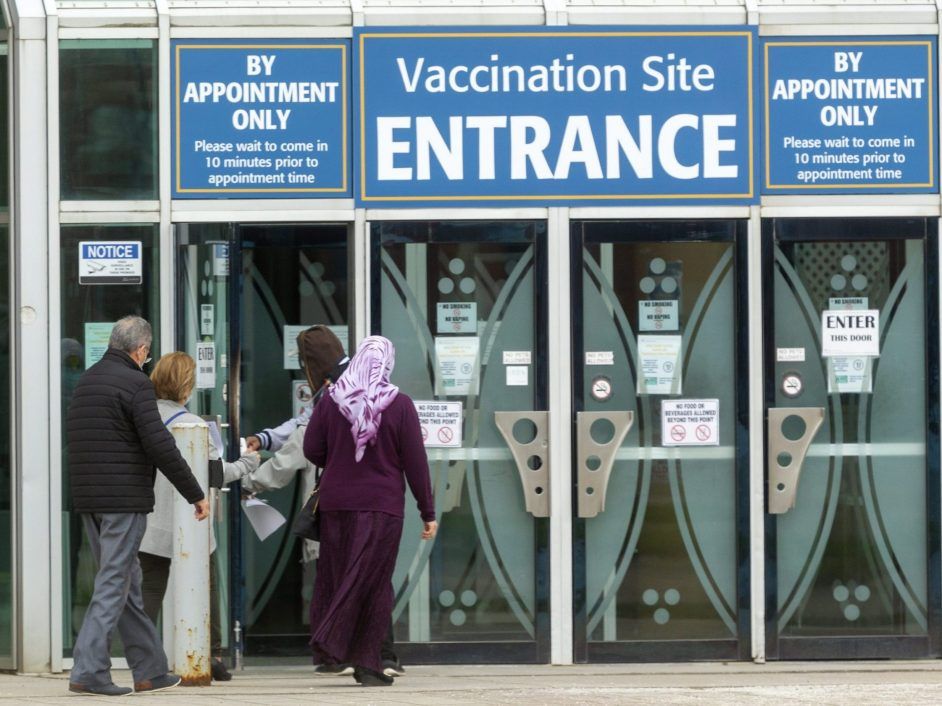
 torontosun.com
torontosun.com
Author of the article:Canadian Press
Canadian Press
Morgan Lowrie
Publishing date:Apr 26, 2021 • 13 hours ago • 2 minute read • Join the conversation
People arrive for their COVID-19 vaccinations at the Western Fair Agriplex in London, Ont., Sunday, April 25, 2021.
People arrive for their COVID-19 vaccinations at the Western Fair Agriplex in London, Ont., Sunday, April 25, 2021. PHOTO BY MIKE HENSEN /The London Free Press / Postmedia Network
Article content
Several provinces were imposing new public health restrictions to curb the spread of COVID-19 on Monday, as authorities across the country continued to struggle against a third wave of the disease that is claiming lives and straining intensive care capacity.
Nova Scotia reported a single-day record for new COVID-19 cases for the second day in a row on Monday, with 66 new infections.
Premier Iain Rankin said Sunday his province was at “a very serious crossroads” in its fight against COVID-19, as he tightened rules for travel and gatherings and doubled fines for those who violate public health orders.
In Alberta, councillors for the Wood Buffalo Regional Municipality voted on Sunday to declare a state of local emergency to curb rising cases of COVID-19. The measure, which has yet to be officially instated, will support future council actions that “could include enhanced measures to curb the COVID-19 emergency within the region,” the council said in a statement.
Advertisement
STORY CONTINUES BELOW
This advertisement has not loaded yet, but your article continues below.
Article content
Two school divisions in Fort McMurray, part of the Wood Buffalo region, announced their schools were closing to in-person learning until May 10.
Manitoba is expected to announce new restrictions later Monday, while Toronto is set to say which workplaces will close under new rules aimed at bringing COVID-19 outbreaks under control.
In Ontario, the death of a 13-year-old girl provided a reminder of the dangers of a pandemic that authorities say has increasingly impacted younger Canadians. Emily Viegas died of COVID-19 last Thursday after her father, an essential worker, tried to care for her in the family apartment in Brampton, west of Toronto.
Politicians including Premier Doug Ford expressed their condolences to the family, while critics accused the provincial government of failing to protect the hard-hit Brampton area, which is home to many large workplaces and essential workers.
While Ontario reported more than 3,500 new cases and 24 more deaths, there was reason for cautious optimism in Quebec.
The province reported fewer than 1,000 new cases for the first time in April, even as Health Minister Christian Dube expressed concern over a slight rise in hospital numbers and urged Quebecers not to become complacent.
Several provinces were also expanding their vaccination programs to target populations perceived to be most at risk.
Alberta said it would announce plans Monday to vaccinate meat-plant workers, while Manitoba said adults of all ages in the northern health region and in Winnipeg’s Seven Oaks West neighbourhood can now get a shot.
Ontario, meanwhile, said it was working on a pilot project to allow some pharmacies to administer the Pfizer-BioNTech COVID-19 vaccine, as supplies of the Oxford-AstraZeneca shot run low and future deliveries remain uncertain.

Additional restrictions coming to some provinces struggling with COVID-19 spikes
Several provinces were imposing new public health restrictions to curb the spread of COVID-19 on Monday, as authorities across the country continued to struggle aga…
Federal Court judge dismisses bid to halt hotel quarantines
Author of the article:Canadian Press
Canadian Press
Christopher Reynolds
Publishing date:Apr 26, 2021 • 13 hours ago • 2 minute read • Join the conversation
The Alt Hotel Pearson Airport is one of five hotels designated by the federal government to be used to quarantine air travellers flying into Toronto Pearson International Airport.
The Alt Hotel Pearson Airport is one of five hotels designated by the federal government to be used to quarantine air travellers flying into Toronto Pearson International Airport. PHOTO BY JOE WARMINGTON /Postmedia Network
Article content
OTTAWA — A group of air travellers has lost a Federal Court bid for an interim injunction to prohibit hotel quarantines for returning passengers.
Justice William Pentney said in a written ruling that the three-day stay in federally designated facilities does not put Canadians’ security at significant risk.
The mandatory quarantine — part of a two-week self-isolation regime for travellers flying back from abroad — came into effect on Feb. 22 following federal measures announced the previous month amid the second wave of the COVID-19 pandemic. It includes a coronavirus test upon arrival and can cost up to $2,000.
It has faced some backlash from opposition MPs, civil liberties groups and health experts for either coming too late, encroaching on individual freedoms or not going far enough.
However, the judge said the risk that travellers will unwittingly carry COVID-19 variants over the border even after testing negative before flight departure means the measures should stand until a final ruling comes down.
Advertisement
STORY CONTINUES BELOW
This advertisement has not loaded yet, but your article continues below.
Article content
“I do not doubt that the applicants, and other travellers, may be vexed and inconvenienced by the requirement to pay to stay at a hotel while they wait for the results of their COVID-19 test. However, I do not accept that doing so exposes these travellers to any significant security risk,” Pentney wrote in the ruling released Friday.
The broader case against the hotel stays, organized by the Calgary-based Justice Centre for Constitutional Freedoms, is slated to continue in Federal Court with a three-day hearing starting June 1.
Justice Centre spokesman Jay Cameron said the federal government will have “to account for the incarceration of Canadians without due process.”
“The forced isolation of Canadians in federal facilities, even though they are asymptomatic and have already tested negative for COVID, is an unwarranted, arbitrary and unjustified detention that is a shameful blight on the nation,” he said in an email.
Multiple G20 countries have arguably stricter quarantine measures. Australia, the United Kingdom, China and Japan mandate hotel quarantines ranging from 10 days to three weeks for some or most arrivals.
The preliminary ruling did not examine the applicants’ core claims under sections 7 and 9 of the Charter of Rights and Freedoms, which protect Canadians’ right to life, liberty and security and their right not to be arbitrarily detained, respectively. These will come under the microscope after a full hearing in five weeks, the judge said.
Advertisement
STORY CONTINUES BELOW
This advertisement has not loaded yet, but your article continues below.
Article content
Conservative Leader Erin O’Toole on Monday called for tighter travel restrictions rather than “half measures” by the Liberal government.
He said Canada should consider an immediate ban on all international flights, particularly COVID-19 hot spots, and implement rapid testing at airports and land-border crossings to keep out more transmissible strains of the virus.
Prime Minister Justin Trudeau has said Canada has among the strictest travel and border rules across the globe, including the 14-day self-isolation and a ban on travel into the country by most non-residents.
On Thursday, the federal government announced a 30-day ban on all direct flights from India and Pakistan as case numbers spike at home and more contagious strains including the B.1.6.1.7 variant ravage the subcontinent.

 torontosun.com
torontosun.com
Author of the article:Canadian Press
Canadian Press
Christopher Reynolds
Publishing date:Apr 26, 2021 • 13 hours ago • 2 minute read • Join the conversation
The Alt Hotel Pearson Airport is one of five hotels designated by the federal government to be used to quarantine air travellers flying into Toronto Pearson International Airport.
The Alt Hotel Pearson Airport is one of five hotels designated by the federal government to be used to quarantine air travellers flying into Toronto Pearson International Airport. PHOTO BY JOE WARMINGTON /Postmedia Network
Article content
OTTAWA — A group of air travellers has lost a Federal Court bid for an interim injunction to prohibit hotel quarantines for returning passengers.
Justice William Pentney said in a written ruling that the three-day stay in federally designated facilities does not put Canadians’ security at significant risk.
The mandatory quarantine — part of a two-week self-isolation regime for travellers flying back from abroad — came into effect on Feb. 22 following federal measures announced the previous month amid the second wave of the COVID-19 pandemic. It includes a coronavirus test upon arrival and can cost up to $2,000.
It has faced some backlash from opposition MPs, civil liberties groups and health experts for either coming too late, encroaching on individual freedoms or not going far enough.
However, the judge said the risk that travellers will unwittingly carry COVID-19 variants over the border even after testing negative before flight departure means the measures should stand until a final ruling comes down.
Advertisement
STORY CONTINUES BELOW
This advertisement has not loaded yet, but your article continues below.
Article content
“I do not doubt that the applicants, and other travellers, may be vexed and inconvenienced by the requirement to pay to stay at a hotel while they wait for the results of their COVID-19 test. However, I do not accept that doing so exposes these travellers to any significant security risk,” Pentney wrote in the ruling released Friday.
The broader case against the hotel stays, organized by the Calgary-based Justice Centre for Constitutional Freedoms, is slated to continue in Federal Court with a three-day hearing starting June 1.
Justice Centre spokesman Jay Cameron said the federal government will have “to account for the incarceration of Canadians without due process.”
“The forced isolation of Canadians in federal facilities, even though they are asymptomatic and have already tested negative for COVID, is an unwarranted, arbitrary and unjustified detention that is a shameful blight on the nation,” he said in an email.
Multiple G20 countries have arguably stricter quarantine measures. Australia, the United Kingdom, China and Japan mandate hotel quarantines ranging from 10 days to three weeks for some or most arrivals.
The preliminary ruling did not examine the applicants’ core claims under sections 7 and 9 of the Charter of Rights and Freedoms, which protect Canadians’ right to life, liberty and security and their right not to be arbitrarily detained, respectively. These will come under the microscope after a full hearing in five weeks, the judge said.
Advertisement
STORY CONTINUES BELOW
This advertisement has not loaded yet, but your article continues below.
Article content
Conservative Leader Erin O’Toole on Monday called for tighter travel restrictions rather than “half measures” by the Liberal government.
He said Canada should consider an immediate ban on all international flights, particularly COVID-19 hot spots, and implement rapid testing at airports and land-border crossings to keep out more transmissible strains of the virus.
Prime Minister Justin Trudeau has said Canada has among the strictest travel and border rules across the globe, including the 14-day self-isolation and a ban on travel into the country by most non-residents.
On Thursday, the federal government announced a 30-day ban on all direct flights from India and Pakistan as case numbers spike at home and more contagious strains including the B.1.6.1.7 variant ravage the subcontinent.

Federal Court judge dismisses bid to halt hotel quarantines
OTTAWA — A group of air travellers has lost a Federal Court bid for an interim injunction to prohibit hotel quarantines for returning passengers.
U.K. PM Johnson denies saying 'let the bodies pile high'
Author of the article:Reuters
Reuters
Guy Faulconbridge, Andy Bruce and William James
Publishing date:Apr 26, 2021 • 18 hours ago • 2 minute read • Join the conversation
Britain's Prime Minister Boris Johnson plays table tennis during his visit to Net World Sports as he campaigns on behalf of Conservative Party candidate Jeremy Kent in Wrexham, Wales, on Monday, April 26, 2021.
Britain's Prime Minister Boris Johnson plays table tennis during his visit to Net World Sports as he campaigns on behalf of Conservative Party candidate Jeremy Kent in Wrexham, Wales, on Monday, April 26, 2021. PHOTO BY ROB FORMSTONE / POOL /AFP via Getty Images
Article content
LONDON — British Prime Minister Boris Johnson on Monday denied a newspaper report that he had said he would rather bodies piled “high in their thousands” than order a third COVID-19 lockdown.
Johnson is facing a stream of allegations in newspapers – all of them denied – about everything from his muddled initial handling of the COVID-19 crisis to questions over who financed the redecoration of his official apartment.
The Daily Mail newspaper cited unidentified sources as saying that, in October, shortly after agreeing to a second lockdown, Johnson told a meeting in Downing Street: “No more f—— lockdowns – let the bodies pile high in their thousands.”
Asked whether he had made the remark, Johnson told broadcasters: “No, but again, I think the important thing, I think, that people want us to get on and do as a government is to make sure that the lockdowns work, and they have.”
The Daily Mail did not respond to a request for comment but the BBC later also reported that Johnson made the remark in a “heated discussion” about lockdowns. Reuters was unable to immediately verify the reports.
Advertisement
STORY CONTINUES BELOW
This advertisement has not loaded yet, but your article continues below.
Article content
Though Johnson has over the years repeatedly weathered gaffes, crises over Brexit and disclosures about his adultery, he is now grappling with an array of accusations which opponents say show he is unfit for office. He or his supporters have denied all of them.
Opposition Labour Party leader Keir Starmer, who has cast Johnson’s government as “sleazy,” said he was astonished to read the Daily Mail’s report.
“If he did say those things, he’s got to explain it,” he said.
Johnson did impose a third lockdown, in January, though critics say it could have been avoided had he yielded to pressure from senior ministers to make the second lockdown more stringent.
Britain has the world’s fifth largest official COVID-19 death toll, with 127,681 deaths, after the United States, Brazil, Mexico and India, according to Johns Hopkins University of Medicine.
Downing Street last week named Johnson’s former chief adviser, Dominic Cummings, as the source of leaks against the prime minister. But Cummings denied he was the source and cast Johnson as incompetent and lacking in integrity.
Johnson, 56, and Cummings, 49, were once close allies who worked on the successful ‘Vote Leave’ campaign to take Britain out of the European Union in the 2016 referendum.
Cummings also advised Johnson in the 2019 election campaign, which won the Conservatives their biggest parliamentary majority since 1987, but he left the prime minister’s staff suddenly late last year.
Advertisement
STORY CONTINUES BELOW
This advertisement has not loaded yet, but your article continues below.
Article content
Cummings said Johnson had planned to have donors pay secretly for the renovation of his Downing Street apartment, adding that was “unethical, foolish, possibly illegal – and almost certainly broke the rules on proper disclosure of political donations.”
Defence Secretary Ben Wallace on Monday declined to confirm or deny if Johnson had been given an undeclared loan from political donors to pay for the renovation of the flat. What mattered now was that Johnson had borne the cost himself, Wallace said.
“Do I think the prime minister is sleazy? No, I don’t,” he told BBC radio.
Asked last month about the refurbishment plans, Johnson’s spokeswoman said all donations, gifts and benefits were properly declared, and that no party funds were being used to pay for the refurbishment.
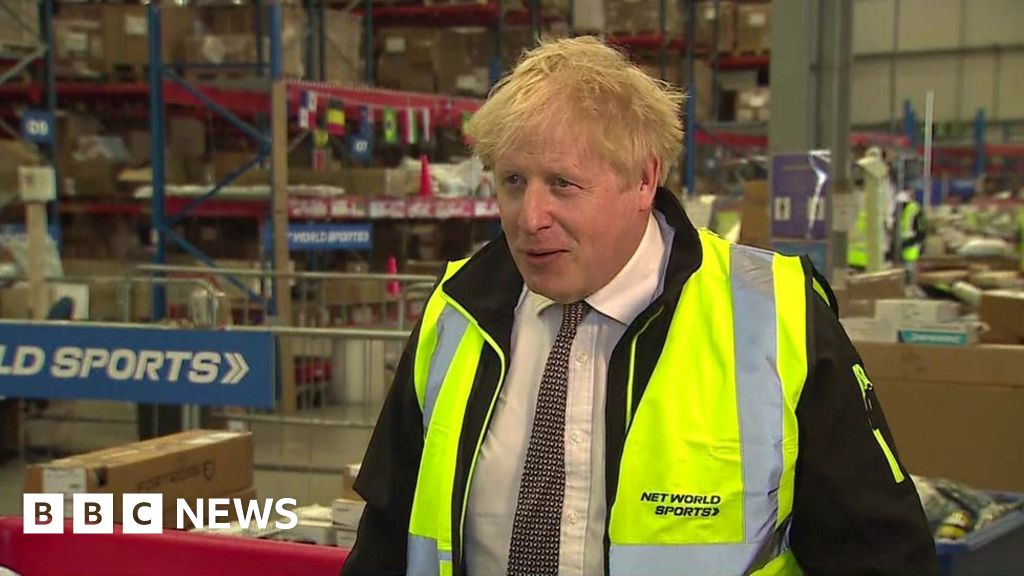
 bbc.com
bbc.com

 dailymail.co.uk
dailymail.co.uk
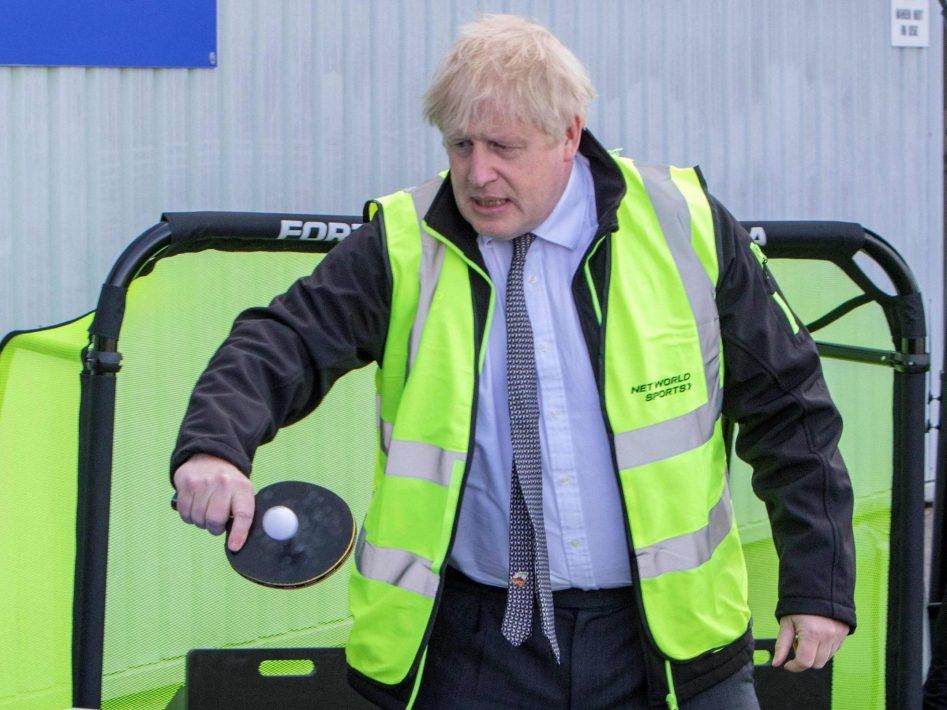
 torontosun.com
torontosun.com
Author of the article:Reuters
Reuters
Guy Faulconbridge, Andy Bruce and William James
Publishing date:Apr 26, 2021 • 18 hours ago • 2 minute read • Join the conversation
Britain's Prime Minister Boris Johnson plays table tennis during his visit to Net World Sports as he campaigns on behalf of Conservative Party candidate Jeremy Kent in Wrexham, Wales, on Monday, April 26, 2021.
Britain's Prime Minister Boris Johnson plays table tennis during his visit to Net World Sports as he campaigns on behalf of Conservative Party candidate Jeremy Kent in Wrexham, Wales, on Monday, April 26, 2021. PHOTO BY ROB FORMSTONE / POOL /AFP via Getty Images
Article content
LONDON — British Prime Minister Boris Johnson on Monday denied a newspaper report that he had said he would rather bodies piled “high in their thousands” than order a third COVID-19 lockdown.
Johnson is facing a stream of allegations in newspapers – all of them denied – about everything from his muddled initial handling of the COVID-19 crisis to questions over who financed the redecoration of his official apartment.
The Daily Mail newspaper cited unidentified sources as saying that, in October, shortly after agreeing to a second lockdown, Johnson told a meeting in Downing Street: “No more f—— lockdowns – let the bodies pile high in their thousands.”
Asked whether he had made the remark, Johnson told broadcasters: “No, but again, I think the important thing, I think, that people want us to get on and do as a government is to make sure that the lockdowns work, and they have.”
The Daily Mail did not respond to a request for comment but the BBC later also reported that Johnson made the remark in a “heated discussion” about lockdowns. Reuters was unable to immediately verify the reports.
Advertisement
STORY CONTINUES BELOW
This advertisement has not loaded yet, but your article continues below.
Article content
Though Johnson has over the years repeatedly weathered gaffes, crises over Brexit and disclosures about his adultery, he is now grappling with an array of accusations which opponents say show he is unfit for office. He or his supporters have denied all of them.
Opposition Labour Party leader Keir Starmer, who has cast Johnson’s government as “sleazy,” said he was astonished to read the Daily Mail’s report.
“If he did say those things, he’s got to explain it,” he said.
Johnson did impose a third lockdown, in January, though critics say it could have been avoided had he yielded to pressure from senior ministers to make the second lockdown more stringent.
Britain has the world’s fifth largest official COVID-19 death toll, with 127,681 deaths, after the United States, Brazil, Mexico and India, according to Johns Hopkins University of Medicine.
Downing Street last week named Johnson’s former chief adviser, Dominic Cummings, as the source of leaks against the prime minister. But Cummings denied he was the source and cast Johnson as incompetent and lacking in integrity.
Johnson, 56, and Cummings, 49, were once close allies who worked on the successful ‘Vote Leave’ campaign to take Britain out of the European Union in the 2016 referendum.
Cummings also advised Johnson in the 2019 election campaign, which won the Conservatives their biggest parliamentary majority since 1987, but he left the prime minister’s staff suddenly late last year.
Advertisement
STORY CONTINUES BELOW
This advertisement has not loaded yet, but your article continues below.
Article content
Cummings said Johnson had planned to have donors pay secretly for the renovation of his Downing Street apartment, adding that was “unethical, foolish, possibly illegal – and almost certainly broke the rules on proper disclosure of political donations.”
Defence Secretary Ben Wallace on Monday declined to confirm or deny if Johnson had been given an undeclared loan from political donors to pay for the renovation of the flat. What mattered now was that Johnson had borne the cost himself, Wallace said.
“Do I think the prime minister is sleazy? No, I don’t,” he told BBC radio.
Asked last month about the refurbishment plans, Johnson’s spokeswoman said all donations, gifts and benefits were properly declared, and that no party funds were being used to pay for the refurbishment.

Covid: Boris Johnson's 'bodies pile high' comments prompt criticism
The prime minister has strongly denied saying the phrase, describing the reports as "total rubbish".

Sources claim PM would rather 'bodies pile high' over third lockdown
Downing Street last night strongly denied the Prime Minister made the comment, insisting it was 'just another lie'. But those who say they heard it stand by their claim.

U.K. PM Johnson denies saying 'let the bodies pile high'
LONDON — British Prime Minister Boris Johnson on Monday denied a newspaper report that he had said he would rather bodies piled “high in their thousands” than order…
EU sues AstraZeneca over breach of COVID-19 vaccine supply contract
Author of the article:Reuters
Reuters
Francesco Guarascio and Giselda Vagnoni
Publishing date:Apr 26, 2021 • 16 hours ago • 3 minute read • Join the conversation
This file photo taken Feb. 11, 2021, shows doses of the AstraZeneca vaccine in Rome's Fiumicino airport.
This file photo taken Feb. 11, 2021, shows doses of the AstraZeneca vaccine in Rome's Fiumicino airport. PHOTO BY TIZIANA FABI /AFP via Getty Images
Article content
BRUSSELS — The European Commission said on Monday it had launched legal action against AstraZeneca for not respecting its contract for the supply of COVID-19 vaccines and for not having a “reliable” plan to ensure timely deliveries.
AstraZeneca said in response that the legal action by the EU was without merit and pledged to defend itself strongly in court.
Under the contract, the Anglo-Swedish company had committed to making its “best reasonable efforts” to deliver 180 million vaccine doses to the EU in the second quarter of this year, for a total of 300 million in the period from December to June.
But AstraZeneca said in a statement on March 12 it would aim to deliver only one-third of that by the end of June, of which about 70 million would be in the second quarter. A week after that, the Commission sent a legal letter to the company in the first step of a formal procedure to resolve disputes.
AstraZeneca’s delays have contributed towards hampering the bloc’s vaccination drive, as the vaccine developed by Oxford University was initially supposed to be the main one in an EU rollout in the first half of this year. After repeated cuts in supplies, the bloc changed its plans and now relies mostly on the Pfizer-BioNTech vaccine.
Advertisement
STORY CONTINUES BELOW
This advertisement has not loaded yet, but your article continues below.
Article content
“The Commission has started last Friday a legal action against AstraZeneca,” the EU spokesman told a news conference, noting all 27 EU states backed the move.
“Some terms of the contract have not been respected and the company has not been in a position to come up with a reliable strategy to ensure timely delivery of doses,” the spokesman said, explaining what triggered the move.
“AstraZeneca has fully complied with the Advance Purchase Agreement with the European Commission and will strongly defend itself in court. We believe any litigation is without merit and we welcome this opportunity to resolve this dispute as soon as possible,” AstraZeneca said.
Under the contract, the case will need to be resolved by Belgian courts.
“We want to make sure there is a speedy delivery of a sufficient number of doses that European citizens are entitled to and which have been promised on the basis of the contract,” the spokesman said.
EU officials confirmed the purpose of the legal action was to ensure more supplies than what the company has said it would aim to deliver.
The move follows months of rows with the company over supply issues and amid concerns over the efficacy and safety of the vaccine. Still, while the shot has been linked to very rare cases of blood clots, the EU drugs regulator has recommended its use to contain the spread of COVID-19.
“We had to send a message to (Pascal) Soriot,” an EU official said, referring to AstraZeneca’s chief executive.
Advertisement
STORY CONTINUES BELOW
This advertisement has not loaded yet, but your article continues below.
Article content
Germany, France and Hungary were among EU states that were initially reticent to sue the company, mostly on the grounds that the move might not speed up deliveries, diplomats said, but eventually they supported it.
After the announcement of the legal action, AstraZeneca said it was in the process of delivering nearly 50 million doses by the end of April, a goal which is in line with the revised-down target of supplying only 100 million shots by the end of the quarter.
The EU wants AstraZeneca to deliver as many as possible of the promised 300 million doses, but would settle for 130 million shots by the end of June, one EU source familiar with the discussions told Reuters, adding the EU had launched an urgent legal procedure and was invoking financial penalties in case of non-compliance.
In a further sign of its irritation towards the company, it has already forgone another 100 million shots that it had an option to buy under the contract signed in August.
The spat with AstraZeneca has also stoked a dispute over supplies with former EU member Britain. AstraZeneca said it was prevented from exporting doses from UK factories to make up for some of the shortfalls in the EU, EU officials have said. Now the EU is opposing the export of AstraZeneca shots to Britain from a factory in the Netherlands.
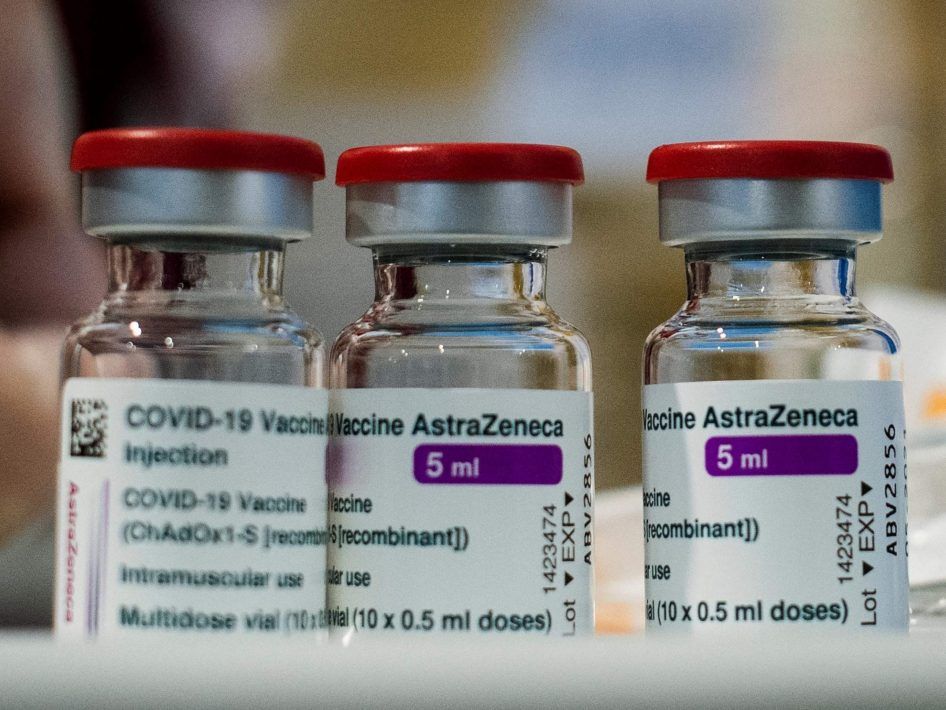
 torontosun.com
torontosun.com
Author of the article:Reuters
Reuters
Francesco Guarascio and Giselda Vagnoni
Publishing date:Apr 26, 2021 • 16 hours ago • 3 minute read • Join the conversation
This file photo taken Feb. 11, 2021, shows doses of the AstraZeneca vaccine in Rome's Fiumicino airport.
This file photo taken Feb. 11, 2021, shows doses of the AstraZeneca vaccine in Rome's Fiumicino airport. PHOTO BY TIZIANA FABI /AFP via Getty Images
Article content
BRUSSELS — The European Commission said on Monday it had launched legal action against AstraZeneca for not respecting its contract for the supply of COVID-19 vaccines and for not having a “reliable” plan to ensure timely deliveries.
AstraZeneca said in response that the legal action by the EU was without merit and pledged to defend itself strongly in court.
Under the contract, the Anglo-Swedish company had committed to making its “best reasonable efforts” to deliver 180 million vaccine doses to the EU in the second quarter of this year, for a total of 300 million in the period from December to June.
But AstraZeneca said in a statement on March 12 it would aim to deliver only one-third of that by the end of June, of which about 70 million would be in the second quarter. A week after that, the Commission sent a legal letter to the company in the first step of a formal procedure to resolve disputes.
AstraZeneca’s delays have contributed towards hampering the bloc’s vaccination drive, as the vaccine developed by Oxford University was initially supposed to be the main one in an EU rollout in the first half of this year. After repeated cuts in supplies, the bloc changed its plans and now relies mostly on the Pfizer-BioNTech vaccine.
Advertisement
STORY CONTINUES BELOW
This advertisement has not loaded yet, but your article continues below.
Article content
“The Commission has started last Friday a legal action against AstraZeneca,” the EU spokesman told a news conference, noting all 27 EU states backed the move.
“Some terms of the contract have not been respected and the company has not been in a position to come up with a reliable strategy to ensure timely delivery of doses,” the spokesman said, explaining what triggered the move.
“AstraZeneca has fully complied with the Advance Purchase Agreement with the European Commission and will strongly defend itself in court. We believe any litigation is without merit and we welcome this opportunity to resolve this dispute as soon as possible,” AstraZeneca said.
Under the contract, the case will need to be resolved by Belgian courts.
“We want to make sure there is a speedy delivery of a sufficient number of doses that European citizens are entitled to and which have been promised on the basis of the contract,” the spokesman said.
EU officials confirmed the purpose of the legal action was to ensure more supplies than what the company has said it would aim to deliver.
The move follows months of rows with the company over supply issues and amid concerns over the efficacy and safety of the vaccine. Still, while the shot has been linked to very rare cases of blood clots, the EU drugs regulator has recommended its use to contain the spread of COVID-19.
“We had to send a message to (Pascal) Soriot,” an EU official said, referring to AstraZeneca’s chief executive.
Advertisement
STORY CONTINUES BELOW
This advertisement has not loaded yet, but your article continues below.
Article content
Germany, France and Hungary were among EU states that were initially reticent to sue the company, mostly on the grounds that the move might not speed up deliveries, diplomats said, but eventually they supported it.
After the announcement of the legal action, AstraZeneca said it was in the process of delivering nearly 50 million doses by the end of April, a goal which is in line with the revised-down target of supplying only 100 million shots by the end of the quarter.
The EU wants AstraZeneca to deliver as many as possible of the promised 300 million doses, but would settle for 130 million shots by the end of June, one EU source familiar with the discussions told Reuters, adding the EU had launched an urgent legal procedure and was invoking financial penalties in case of non-compliance.
In a further sign of its irritation towards the company, it has already forgone another 100 million shots that it had an option to buy under the contract signed in August.
The spat with AstraZeneca has also stoked a dispute over supplies with former EU member Britain. AstraZeneca said it was prevented from exporting doses from UK factories to make up for some of the shortfalls in the EU, EU officials have said. Now the EU is opposing the export of AstraZeneca shots to Britain from a factory in the Netherlands.

EU sues AstraZeneca over breach of COVID-19 vaccine supply contract
BRUSSELS — The European Commission said on Monday it had launched legal action against AstraZeneca for not respecting its contract for the supply of COVID-19 vaccin…
Quebec woman dies from complication linked to AstraZeneca vaccine
Public health director Dr. Horacio Arruda announced the death on Tuesday.
Author of the article:Katelyn Thomas • Montreal Gazette
Publishing date:Apr 27, 2021 • 10 hours ago • 4 minute read • 74 Comments
The AstraZeneca vaccine is filled into a syringe on Thursday April 8, 2021.
The AstraZeneca vaccine is filled into a syringe on Thursday April 8, 2021. PHOTO BY PIERRE OBENDRAUF /Montreal Gazette
Article content
Quebec has recorded its first death linked to complications from the AstraZeneca vaccine — a woman who developed a blood clot in her brain, public health director Dr. Horacio Arruda announced on Tuesday. Health Canada later confirmed the death is the first of its kind in Canada.
The woman was 54-year-old Francine Boyer of Saint-Rémi, who received a first dose of the AstraZeneca shot with her husband, Alain Serres, on April 9, Serres confirmed Tuesday evening.
Boyer experienced extreme fatigue and headaches for a few days after receiving the vaccine and was taken to the nearest hospital. As her condition worsened, she was transferred to the Montreal Neurological Institute and Hospital where she died of cerebral thrombosis (a blood clot) on Friday.
“Sometimes, unfortunately, there are complications,” Arruda said. “I want to present my most sincere sympathies and condolences to the family.”
Advertisement
STORY CONTINUES BELOW
This advertisement has not loaded yet, but your article continues below.
Article content
The Quebec government and experts say Boyer’s death should not discourage Quebecers from getting vaccinated given that rare cases of complications were expected based on vaccine data from elsewhere.
Boyer’s case is one of four blood clots the province has detected in people who have received the AstraZeneca vaccine so far out of more than 400,000, Health Minister Christian Dubé said. Data shows that roughly one in 100,000 people typically suffer complications, meaning Quebec’s statistics are comparable to those recorded in other places.
“We are, unfortunately, exactly within the average,” Dubé said. “It’s sad, but it’s something we were expecting.”
Two out of the four blood clot cases — including Boyer’s — have been linked directly to the vaccine, while two others are under investigation.
The latter two cases “could be associated to the vaccine or not; there needs to be a confirmation test,” Arruda said. “It happens (that) people get vaccinated and have a blood clot but it’s not associated to this phenomenon.”
The province recently dropped the minimum age to receive the AstraZeneca vaccine from 55 to 45, sending thousands of Quebecers to walk-in clinics last week. Having been born in 1966, Boyer was eligible for the first round of walk-in AstraZeneca vaccinations in Quebec.
Guidelines around who should receive the shot have been changed several times around the world because of extremely rare cases of blood clots with low platelets. Governments and experts alike have largely maintained that the benefits of mass vaccination outweigh the risk of complications, and in Quebec, experts say that is still the case.
Advertisement
STORY CONTINUES BELOW
This advertisement has not loaded yet, but your article continues below.
Article content
“The facts have not changed, as sad as this event is,” said Dr. Alain Lamarre, a specialist in immunology and virology at the Institut national de la recherche scientifique (INRS). “I think most people should know by now that there is this risk. It’s a rare risk, it’s a low risk, but it’s there.”
Despite the risk being extremely low, Lamarre said he can understand Quebecers being worried following the death, since it’s closer to home.
“When it happens in Europe it’s one thing, but if it happens to someone in your region then it hits harder,” he said. “We always think of the greater good, but when you’re the one person in 100,000 or in one million, well, you get the effect 100 per cent.”
Dr. Jörg Fritz, an associate professor in the department of immunology and microbiology at McGill University, contextualized the risk associated to the AstraZeneca vaccine with other situations in which people can experience blood clots.
“In a lot of people, thrombosis occurs with flying, with taking the (contraceptive) pill,” he said. “These are all things where thrombosis increasingly occurs even at higher rates than the COVID vaccine.”
Lamarre pointed out that in those cases, blood clots generally don’t appear in the brain, but that they can still be dangerous and are indeed much more frequent.
“It’s for sure higher than one in 100,000,” he said.
There have also been documented cases of blood clots in COVID long-haulers — people who experience complications months after recovering, Fritz said. And if you look at the statistics, people are more likely to die in a car accident than they are to die from complications related to the AstraZeneca vaccine, which is why Fritz said it’s all about risk assessment.
Advertisement
STORY CONTINUES BELOW
This advertisement has not loaded yet, but your article continues below.
Article content
“I know that’s not very reassuring if you think, ‘Oh, I might be the one who might have the complication,’ but just looking at the statistics, in the end, there is a risk with everything we do,” he said. “I think putting that all together, the benefits of getting the vaccine are clearly much stronger than the risks that we are facing.”
Both experts said it’s important to factor a person’s medical history into any complications and that more data is needed to understand why some have died as a result of them, including how they were treated in the hospital.
In the meantime, they said, the risks remain rare enough that the benefits outweigh them as mass vaccination is the only way out of the pandemic.
“We need to not only focus on this very sad but very rare event, but also see the big picture and see the vaccines are working, and that’s the positive side of things,” Lamarre said.
Boyer’s family is encouraging Quebecers who get vaccinated to monitor themselves for any strange symptoms and to communicate with Info-Santé (811) immediately if they have concerns.
kthomas@postmedia.com
MORE ON THIS TOPIC
Quebec Premier Francois Legault answers a question during press conference in Montreal Tuesday April 6, 2021.
COVID-19 live updates for Tuesday, April 27
A CAE employee receives an AstraZeneca Covid-19 vaccination at the company-sponsored Covid-19 centre in Montreal, on Monday, April 26, 2021.
Business site vaccination program kicks off at CAE in St-Laurent
All our coronavirus-related news can always be found at montrealgazette.com/tag/coronavirus.
Sign up for our email newsletter dedicated to local COVID-19 coverage at montrealgazette.com/coronavirusnews.
Help support our local journalism by subscribing to the Montreal Gazette here.

 serrefinnegan.com
serrefinnegan.com
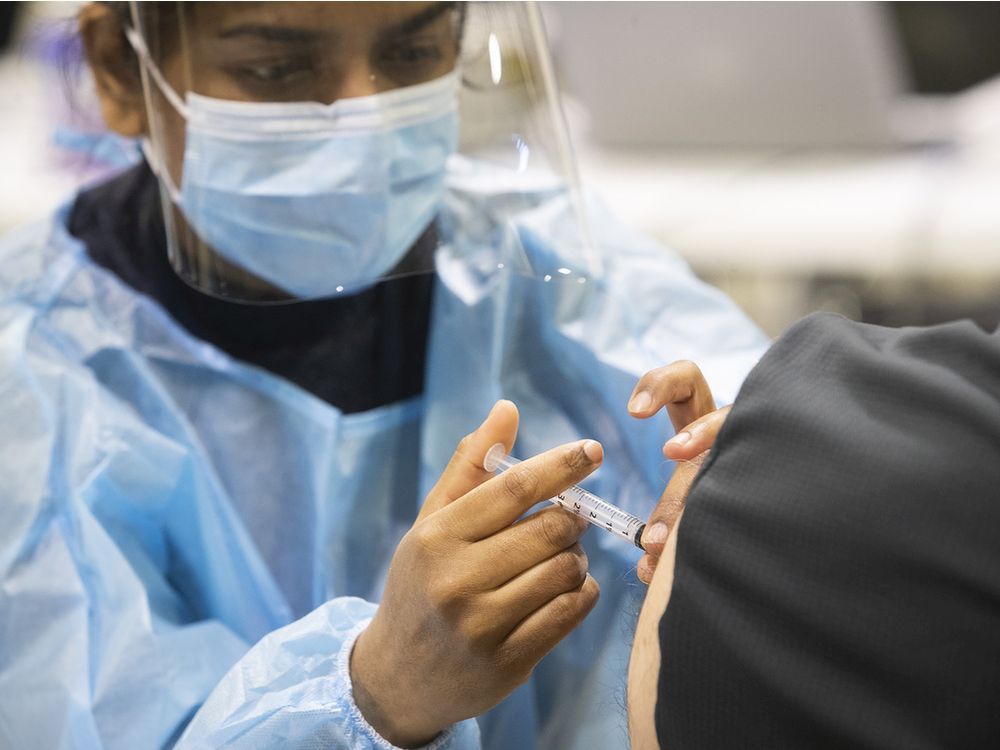
 torontosun.com
torontosun.com
Public health director Dr. Horacio Arruda announced the death on Tuesday.
Author of the article:Katelyn Thomas • Montreal Gazette
Publishing date:Apr 27, 2021 • 10 hours ago • 4 minute read • 74 Comments
The AstraZeneca vaccine is filled into a syringe on Thursday April 8, 2021.
The AstraZeneca vaccine is filled into a syringe on Thursday April 8, 2021. PHOTO BY PIERRE OBENDRAUF /Montreal Gazette
Article content
Quebec has recorded its first death linked to complications from the AstraZeneca vaccine — a woman who developed a blood clot in her brain, public health director Dr. Horacio Arruda announced on Tuesday. Health Canada later confirmed the death is the first of its kind in Canada.
The woman was 54-year-old Francine Boyer of Saint-Rémi, who received a first dose of the AstraZeneca shot with her husband, Alain Serres, on April 9, Serres confirmed Tuesday evening.
Boyer experienced extreme fatigue and headaches for a few days after receiving the vaccine and was taken to the nearest hospital. As her condition worsened, she was transferred to the Montreal Neurological Institute and Hospital where she died of cerebral thrombosis (a blood clot) on Friday.
“Sometimes, unfortunately, there are complications,” Arruda said. “I want to present my most sincere sympathies and condolences to the family.”
Advertisement
STORY CONTINUES BELOW
This advertisement has not loaded yet, but your article continues below.
Article content
The Quebec government and experts say Boyer’s death should not discourage Quebecers from getting vaccinated given that rare cases of complications were expected based on vaccine data from elsewhere.
Boyer’s case is one of four blood clots the province has detected in people who have received the AstraZeneca vaccine so far out of more than 400,000, Health Minister Christian Dubé said. Data shows that roughly one in 100,000 people typically suffer complications, meaning Quebec’s statistics are comparable to those recorded in other places.
“We are, unfortunately, exactly within the average,” Dubé said. “It’s sad, but it’s something we were expecting.”
Two out of the four blood clot cases — including Boyer’s — have been linked directly to the vaccine, while two others are under investigation.
The latter two cases “could be associated to the vaccine or not; there needs to be a confirmation test,” Arruda said. “It happens (that) people get vaccinated and have a blood clot but it’s not associated to this phenomenon.”
The province recently dropped the minimum age to receive the AstraZeneca vaccine from 55 to 45, sending thousands of Quebecers to walk-in clinics last week. Having been born in 1966, Boyer was eligible for the first round of walk-in AstraZeneca vaccinations in Quebec.
Guidelines around who should receive the shot have been changed several times around the world because of extremely rare cases of blood clots with low platelets. Governments and experts alike have largely maintained that the benefits of mass vaccination outweigh the risk of complications, and in Quebec, experts say that is still the case.
Advertisement
STORY CONTINUES BELOW
This advertisement has not loaded yet, but your article continues below.
Article content
“The facts have not changed, as sad as this event is,” said Dr. Alain Lamarre, a specialist in immunology and virology at the Institut national de la recherche scientifique (INRS). “I think most people should know by now that there is this risk. It’s a rare risk, it’s a low risk, but it’s there.”
Despite the risk being extremely low, Lamarre said he can understand Quebecers being worried following the death, since it’s closer to home.
“When it happens in Europe it’s one thing, but if it happens to someone in your region then it hits harder,” he said. “We always think of the greater good, but when you’re the one person in 100,000 or in one million, well, you get the effect 100 per cent.”
Dr. Jörg Fritz, an associate professor in the department of immunology and microbiology at McGill University, contextualized the risk associated to the AstraZeneca vaccine with other situations in which people can experience blood clots.
“In a lot of people, thrombosis occurs with flying, with taking the (contraceptive) pill,” he said. “These are all things where thrombosis increasingly occurs even at higher rates than the COVID vaccine.”
Lamarre pointed out that in those cases, blood clots generally don’t appear in the brain, but that they can still be dangerous and are indeed much more frequent.
“It’s for sure higher than one in 100,000,” he said.
There have also been documented cases of blood clots in COVID long-haulers — people who experience complications months after recovering, Fritz said. And if you look at the statistics, people are more likely to die in a car accident than they are to die from complications related to the AstraZeneca vaccine, which is why Fritz said it’s all about risk assessment.
Advertisement
STORY CONTINUES BELOW
This advertisement has not loaded yet, but your article continues below.
Article content
“I know that’s not very reassuring if you think, ‘Oh, I might be the one who might have the complication,’ but just looking at the statistics, in the end, there is a risk with everything we do,” he said. “I think putting that all together, the benefits of getting the vaccine are clearly much stronger than the risks that we are facing.”
Both experts said it’s important to factor a person’s medical history into any complications and that more data is needed to understand why some have died as a result of them, including how they were treated in the hospital.
In the meantime, they said, the risks remain rare enough that the benefits outweigh them as mass vaccination is the only way out of the pandemic.
“We need to not only focus on this very sad but very rare event, but also see the big picture and see the vaccines are working, and that’s the positive side of things,” Lamarre said.
Boyer’s family is encouraging Quebecers who get vaccinated to monitor themselves for any strange symptoms and to communicate with Info-Santé (811) immediately if they have concerns.
kthomas@postmedia.com
Quebec Premier Francois Legault answers a question during press conference in Montreal Tuesday April 6, 2021.
COVID-19 live updates for Tuesday, April 27
A CAE employee receives an AstraZeneca Covid-19 vaccination at the company-sponsored Covid-19 centre in Montreal, on Monday, April 26, 2021.
Business site vaccination program kicks off at CAE in St-Laurent
All our coronavirus-related news can always be found at montrealgazette.com/tag/coronavirus.
Sign up for our email newsletter dedicated to local COVID-19 coverage at montrealgazette.com/coronavirusnews.
Help support our local journalism by subscribing to the Montreal Gazette here.

Francine Boyer 1966-2021 - Salon funéraire Serre & Finnegan
Originaire de Saint-Rémi, le vendredi, 23 avril 2021 à l’âge de 54 ans, est décédée Francine Boyer, fille de feu René Boyer et de Dolores Roy. Outre sa mère, elle laisse dans le deuil son époux Alain Serres, ses fils Julien (Vanessa), Marc-Antoine (Amanda), ses deux petits-enfants, ses bébés...

Woman's AstraZeneca-related death in Quebec is first in Canada
As sad as the death of Francine Boyer, 54, of Saint-Rémi is, the benefits of vaccination far outweigh the risks, specialist Dr. Alain Lamarre says.
Criticism Mounts As Tucker Carlson Urges Viewers To Call Child Protective Services On Children Wearing Masks Outdoors

Criticism Mounts As Tucker Carlson Urges Viewers To Call Child Protective Services On Children Wearing Masks Outdoors
“Your response when you see children wearing masks as they play should be no different from your response to seeing someone beat a kid at Walmart,” Carlson said.
 www.forbes.com
www.forbes.com
Epsteen's friends are complaining about Tucker again.
BRAUN: Mink are a coronavirus threat to humans
Author of the article:Liz Braun
Publishing date:Apr 27, 2021 • 15 hours ago • 3 minute read • 10 Comments
Mink are seen at a farm in Denmark, November 6, 2020.
Mink are seen at a farm in Denmark, November 6, 2020. PHOTO BY RITZAU SCANPIX /Mads Claus Rasmussen via REUTERS
Article content
It’s a good thing fur coats are out of style.
Farmed mink are playing an unfortunate role in the spread of COVID-19, and now scientists, vets, epidemiologists and animal advocacy groups are sounding the alarm.
Mink are the only animals besides people that transmit, become sick, and die in large numbers from COVID-19. The animals are also identified by the World Health Organization as a top candidate as the “missing link” between bats and people.
The mink raised on farms are capable of spreading COVID-19 into the community, and worse yet, there is evidence of the emergence of new, potentially vaccine-resistant variants of COVID-19 on mink farms.
Coronavirus outbreaks have already happened on North American and European mink farms.
In Denmark, Holland and other parts of Europe, mink were culled in the millions, farms were shut down and farmers compensated through swift government action.
Advertisement
STORY CONTINUES BELOW
This advertisement has not loaded yet, but your article continues below.
Article content
Now various groups in the U.S. are asking for a similar government response.
Letters to the Centre for Disease Control and to the U.S. Departure of Agriculture (on behalf of the Center for a Humane Economy, the Animal Wellness Foundation, Animal Wellness Action, and the Michelson Center for Public Policy) were shared recently with the Toronto Sun.
The letters ask for immediate government action over this potential public health disaster.
Transmission of mutated strains of the disease from mink to humans is a very real threat.
Scott Beckstead, director of Campaigns for the Center for a Humane Economy and Animal Wellness Action, grew up in southern Idaho where his grandfather was a mink farmer. His family home was next to the biggest mink farm in the state.
He knows the turf well.
“Mink have a specific susceptibility to the coronavirus,” said Beckstead, explaining that mutated forms of the disease can be transmitted from mink back to humans — forms that are potentially vaccine-resistant.
Indeed, over seven months in 2020, Denmark reported more than 1,000 human cases of infection with a mink-related variant of the virus; mink-to-human transmission of a new variant in Michigan was discovered recently.
Beckstead said the U.S. must respond to this threat as Europe has done — shut down the industry and compensate farmers.
Most U.S. pelts, ironically, are exported, and mostly to China.
“The fur industry is in decline in the U.S. producers are raising these pelts for export. It’s not a product consumed domestically, it’s not used for food, it’s purely a luxury item for a foreign market,” he said.
Advertisement
STORY CONTINUES BELOW
This advertisement has not loaded yet, but your article continues below.
Article content
Instead of moving quickly as the Europeans did, both federal and state authorities moved instead to protect the industry, said Beckstead. And their response has been to say they’ll vaccinate the mink against the virus, “which may actually make things worse.
“The Canadian federal and provincial governments will be well aware of this.”
Among other issues, mink vaccination puts evolutionary pressure on the COVID-19 virus to mutate, he explained. The mutated forms have the potential for greater ability to infect humans and other animals and be more deadly.
“We’ve seen a very disappointing policy response, given the chance of this prolonging the pandemic. It is very troubling,” said Beckstead.
“Mink are a wild species, and they are a solitary species, except for mating. They are semi-aquatic and roam vast areas. On farms, they are crammed together in crowded conditions. It is a perversely unnatural environment.
“Of course, there are going to be consequences to human health.”
MORE ON THIS TOPIC
U.S. President Joe Biden arrives to speak about loosening COVID-19 mask guidelines outside the White House in Washington, D.C., Tuesday, April 27, 2021.
Biden celebrates easing of mask rules for vaccinated Americans
A man wearing PPE kit can be seen amid funeral pyres before they were lit to perform the last rites of the patients who died of the coronavirus disease at a crematorium on April 24, 2021 in New Delhi, India.
India's hospitals turn away patients in COVID-19 'tsunami'
Britain's Prime Minister Boris Johnson plays table tennis during his visit to Net World Sports as he campaigns on behalf of Conservative Party candidate Jeremy Kent in Wrexham, Wales, on Monday, April 26, 2021.
U.K. PM Johnson denies saying 'let the bodies pile high'
In Canada, the threat from mink farms is considered to be lower, given that a decline in the fur industry has left only about 70 farms intact.
But as the National Post reported earlier this year, outbreaks in the Fraser Valley killed hundreds of mink and infected several farm workers.
Nonetheless, a mink farm still quarantined after a COVID-19 outbreak began its annual breeding program last month, as did eight other farms in British Columbia.
Canadian mink farms may be fewer in number but the threat looms large.
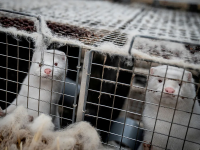
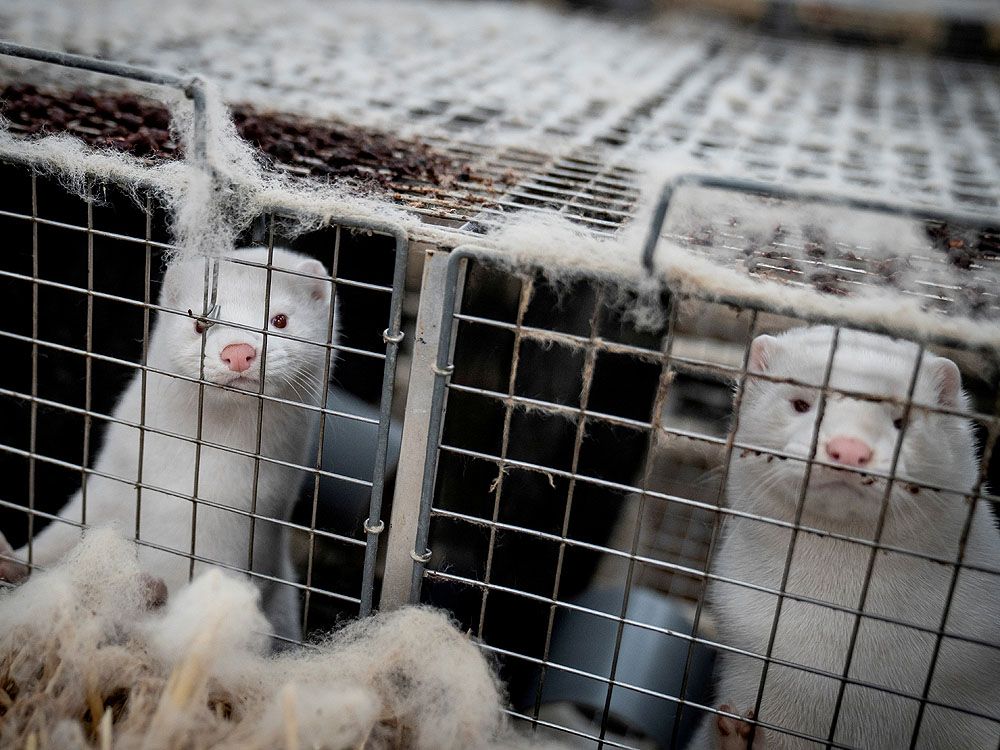
 torontosun.com
torontosun.com
Author of the article:Liz Braun
Publishing date:Apr 27, 2021 • 15 hours ago • 3 minute read • 10 Comments
Mink are seen at a farm in Denmark, November 6, 2020.
Mink are seen at a farm in Denmark, November 6, 2020. PHOTO BY RITZAU SCANPIX /Mads Claus Rasmussen via REUTERS
Article content
It’s a good thing fur coats are out of style.
Farmed mink are playing an unfortunate role in the spread of COVID-19, and now scientists, vets, epidemiologists and animal advocacy groups are sounding the alarm.
Mink are the only animals besides people that transmit, become sick, and die in large numbers from COVID-19. The animals are also identified by the World Health Organization as a top candidate as the “missing link” between bats and people.
The mink raised on farms are capable of spreading COVID-19 into the community, and worse yet, there is evidence of the emergence of new, potentially vaccine-resistant variants of COVID-19 on mink farms.
Coronavirus outbreaks have already happened on North American and European mink farms.
In Denmark, Holland and other parts of Europe, mink were culled in the millions, farms were shut down and farmers compensated through swift government action.
Advertisement
STORY CONTINUES BELOW
This advertisement has not loaded yet, but your article continues below.
Article content
Now various groups in the U.S. are asking for a similar government response.
Letters to the Centre for Disease Control and to the U.S. Departure of Agriculture (on behalf of the Center for a Humane Economy, the Animal Wellness Foundation, Animal Wellness Action, and the Michelson Center for Public Policy) were shared recently with the Toronto Sun.
The letters ask for immediate government action over this potential public health disaster.
Transmission of mutated strains of the disease from mink to humans is a very real threat.
Scott Beckstead, director of Campaigns for the Center for a Humane Economy and Animal Wellness Action, grew up in southern Idaho where his grandfather was a mink farmer. His family home was next to the biggest mink farm in the state.
He knows the turf well.
“Mink have a specific susceptibility to the coronavirus,” said Beckstead, explaining that mutated forms of the disease can be transmitted from mink back to humans — forms that are potentially vaccine-resistant.
Indeed, over seven months in 2020, Denmark reported more than 1,000 human cases of infection with a mink-related variant of the virus; mink-to-human transmission of a new variant in Michigan was discovered recently.
Beckstead said the U.S. must respond to this threat as Europe has done — shut down the industry and compensate farmers.
Most U.S. pelts, ironically, are exported, and mostly to China.
“The fur industry is in decline in the U.S. producers are raising these pelts for export. It’s not a product consumed domestically, it’s not used for food, it’s purely a luxury item for a foreign market,” he said.
Advertisement
STORY CONTINUES BELOW
This advertisement has not loaded yet, but your article continues below.
Article content
Instead of moving quickly as the Europeans did, both federal and state authorities moved instead to protect the industry, said Beckstead. And their response has been to say they’ll vaccinate the mink against the virus, “which may actually make things worse.
“The Canadian federal and provincial governments will be well aware of this.”
Among other issues, mink vaccination puts evolutionary pressure on the COVID-19 virus to mutate, he explained. The mutated forms have the potential for greater ability to infect humans and other animals and be more deadly.
“We’ve seen a very disappointing policy response, given the chance of this prolonging the pandemic. It is very troubling,” said Beckstead.
“Mink are a wild species, and they are a solitary species, except for mating. They are semi-aquatic and roam vast areas. On farms, they are crammed together in crowded conditions. It is a perversely unnatural environment.
“Of course, there are going to be consequences to human health.”
U.S. President Joe Biden arrives to speak about loosening COVID-19 mask guidelines outside the White House in Washington, D.C., Tuesday, April 27, 2021.
Biden celebrates easing of mask rules for vaccinated Americans
A man wearing PPE kit can be seen amid funeral pyres before they were lit to perform the last rites of the patients who died of the coronavirus disease at a crematorium on April 24, 2021 in New Delhi, India.
India's hospitals turn away patients in COVID-19 'tsunami'
Britain's Prime Minister Boris Johnson plays table tennis during his visit to Net World Sports as he campaigns on behalf of Conservative Party candidate Jeremy Kent in Wrexham, Wales, on Monday, April 26, 2021.
U.K. PM Johnson denies saying 'let the bodies pile high'
In Canada, the threat from mink farms is considered to be lower, given that a decline in the fur industry has left only about 70 farms intact.
But as the National Post reported earlier this year, outbreaks in the Fraser Valley killed hundreds of mink and infected several farm workers.
Nonetheless, a mink farm still quarantined after a COVID-19 outbreak began its annual breeding program last month, as did eight other farms in British Columbia.
Canadian mink farms may be fewer in number but the threat looms large.


BRAUN: Mink are a coronavirus threat to humans
It’s a good thing fur coats are out of style.
Joe Rogan urges young fans not to get COVID-19 vaccine
Author of the article:WENN - World Entertainment News Network
Publishing date:Apr 28, 2021 • 21 hours ago • 1 minute read • Join the conversation
Announcer Joe Rogan reacts during UFC 249 at VyStar Veterans Memorial Arena on May 09, 2020 in Jacksonville, Florida.
Announcer Joe Rogan reacts during UFC 249 at VyStar Veterans Memorial Arena on May 09, 2020 in Jacksonville, Florida. PHOTO BY DOUGLAS P. DEFELICE /Getty Images
Article content
Funnyman Joe Rogan has controversially urged young fans not to get vaccinated against Covid-19.
The star made the claim on the April 23 edition of his The Joe Rogan Experience Spotify podcast, saying: “If you’re, like, 21 years old, and you say to me, ‘Should I get vaccinated?’ I’ll go ‘No.’
“People say, ‘Do you think it’s safe to get vaccinated?’ ” he adds. “I’ve said, ‘Yeah I think for the most part it’s safe to get vaccinated.’ I do. I do.”
However, he shares a different viewpoint for fans in their 20s who are young and healthy, insisting: “Look, don’t do anything stupid, but you should take care of yourself.
“You should — if you’re a healthy person, and you’re exercising all the time, and you’re young, and you’re eating well, like, I don’t think you need to worry about this.”
A source close to the situation revealed Spotify reviewed this Rogan episode and left it live because he doesn’t come off as outwardly anti-vaccine, reported TheVerge.com.
Bosses at the streaming platform have taken action in the past; musician Ian Brown had a song, which claimed vaccines inserted microchips into people, removed, while Spotify officials removed Pete Evans’ podcast over COVID-19 misinformation.
At the time, they said in a statement: “Spotify prohibits content on the platform which promotes dangerous false, deceptive, or misleading content about Covid-19 that may cause offline harm and/or pose a direct threat to public health.
“When content that violates this standard is identified it is removed from the platform.”

 torontosun.com
torontosun.com
Author of the article:WENN - World Entertainment News Network
Publishing date:Apr 28, 2021 • 21 hours ago • 1 minute read • Join the conversation
Announcer Joe Rogan reacts during UFC 249 at VyStar Veterans Memorial Arena on May 09, 2020 in Jacksonville, Florida.
Announcer Joe Rogan reacts during UFC 249 at VyStar Veterans Memorial Arena on May 09, 2020 in Jacksonville, Florida. PHOTO BY DOUGLAS P. DEFELICE /Getty Images
Article content
Funnyman Joe Rogan has controversially urged young fans not to get vaccinated against Covid-19.
The star made the claim on the April 23 edition of his The Joe Rogan Experience Spotify podcast, saying: “If you’re, like, 21 years old, and you say to me, ‘Should I get vaccinated?’ I’ll go ‘No.’
“People say, ‘Do you think it’s safe to get vaccinated?’ ” he adds. “I’ve said, ‘Yeah I think for the most part it’s safe to get vaccinated.’ I do. I do.”
However, he shares a different viewpoint for fans in their 20s who are young and healthy, insisting: “Look, don’t do anything stupid, but you should take care of yourself.
“You should — if you’re a healthy person, and you’re exercising all the time, and you’re young, and you’re eating well, like, I don’t think you need to worry about this.”
A source close to the situation revealed Spotify reviewed this Rogan episode and left it live because he doesn’t come off as outwardly anti-vaccine, reported TheVerge.com.
Bosses at the streaming platform have taken action in the past; musician Ian Brown had a song, which claimed vaccines inserted microchips into people, removed, while Spotify officials removed Pete Evans’ podcast over COVID-19 misinformation.
At the time, they said in a statement: “Spotify prohibits content on the platform which promotes dangerous false, deceptive, or misleading content about Covid-19 that may cause offline harm and/or pose a direct threat to public health.
“When content that violates this standard is identified it is removed from the platform.”

Joe Rogan urges young fans not to get COVID-19 vaccine
Funnyman Joe Rogan has controversially urged young fans not to get vaccinated against Covid-19.
PFIZER ADMITS IN ITS OWN MRNA DOCUMENT THAT NON-VACCINATED CAN BE EXPOSED TO THE VACCINE’S SPIKE PROTEINS BY INHALATION OR SKIN CONTACT – [PAGE 67]

Pfizer admits in its own mRNA document that NON-vaccinated can be EXPOSED to the vaccine’s spike proteins by INHALATION or SKIN CONTACT - [page 67] - The Blazing Press
“It’s not a vaccine or anything even remotely related to vaccines. It’s a HUMANICIDE. And it sheds and is highly transmissible by Pfizer’s own gleeful admission. And the self-extermination of mankind required absolutely nothing more than strangers on television re-naming common seasonal colds...
 blazingpress.com
blazingpress.com
Oh, do tell...
SMH.
Hundreds of travellers landing in Canada test positive for COVID-19 variants
Author of the article:Canadian Press
Canadian Press
Publishing date:Apr 28, 2021 • 19 hours ago • 1 minute read • 6 Comments
The Canadian border is pictured at the Peace Arch Canada/USA border crossing in Surrey, B.C. Friday, March 20, 2020.
The Canadian border is pictured at the Peace Arch Canada/USA border crossing in Surrey, B.C. Friday, March 20, 2020. PHOTO BY JONATHAN HAYWARD /THE CANADIAN PRESS
Article content
OTTAWA — More than 2,000 people returning to Canada since mandatory hotel quarantines began have tested positive for COVID-19 and more than a quarter of them were infected with a variant of concern.
The data supplied to The Canadian Press by the Public Health Agency of Canada comes as the federal government is being pressured to take even more steps to keep new variants from getting into the country.
Data shows between Feb. 22 and April 11, 2,018 returning travellers tested positive on a test taken when they arrived in the country.
The agency says that is about one per cent of arrivals.
Further data shows as of April 22, 557 people had tested positive for a variant of concern, including 518 of the strain first identified in the United Kingdom, 27 of the variant first detected in South Africa and 12 of the strain first found in Brazil.
Nazeem Muhajarine, a professor of community health and epidemiology at the University of Saskatchewan, says border restrictions are necessary but will only work well if complemented with local rules and enough testing and tracing to keep cases from spreading.
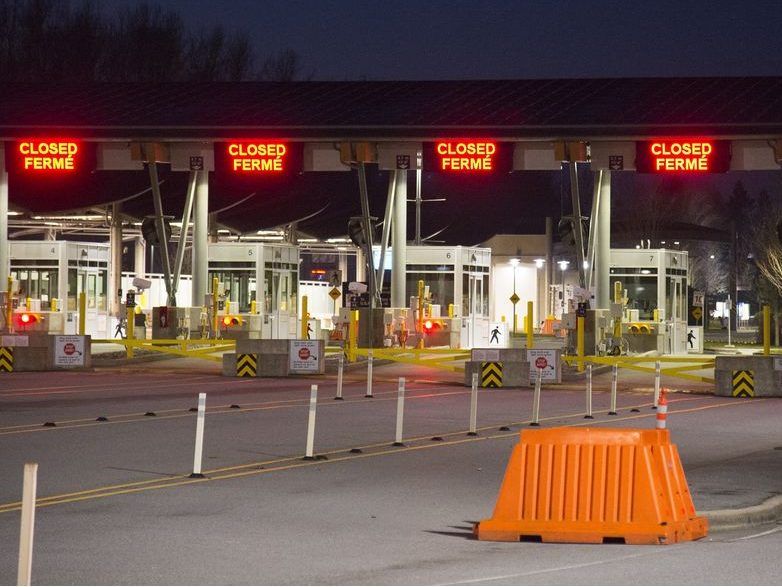
 torontosun.com
torontosun.com
Author of the article:Canadian Press
Canadian Press
Publishing date:Apr 28, 2021 • 19 hours ago • 1 minute read • 6 Comments
The Canadian border is pictured at the Peace Arch Canada/USA border crossing in Surrey, B.C. Friday, March 20, 2020.
The Canadian border is pictured at the Peace Arch Canada/USA border crossing in Surrey, B.C. Friday, March 20, 2020. PHOTO BY JONATHAN HAYWARD /THE CANADIAN PRESS
Article content
OTTAWA — More than 2,000 people returning to Canada since mandatory hotel quarantines began have tested positive for COVID-19 and more than a quarter of them were infected with a variant of concern.
The data supplied to The Canadian Press by the Public Health Agency of Canada comes as the federal government is being pressured to take even more steps to keep new variants from getting into the country.
Data shows between Feb. 22 and April 11, 2,018 returning travellers tested positive on a test taken when they arrived in the country.
The agency says that is about one per cent of arrivals.
Further data shows as of April 22, 557 people had tested positive for a variant of concern, including 518 of the strain first identified in the United Kingdom, 27 of the variant first detected in South Africa and 12 of the strain first found in Brazil.
Nazeem Muhajarine, a professor of community health and epidemiology at the University of Saskatchewan, says border restrictions are necessary but will only work well if complemented with local rules and enough testing and tracing to keep cases from spreading.

Hundreds of travellers landing in Canada test positive for COVID-19 variants
OTTAWA — More than 2,000 people returning to Canada since mandatory hotel quarantines began have tested positive for COVID-19 and more than a quarter of them were i…